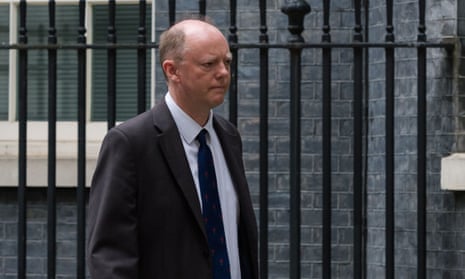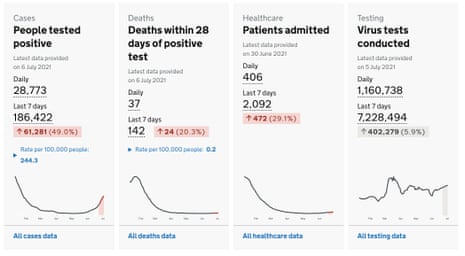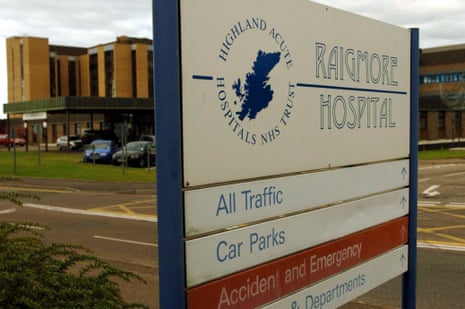Afternoon summary
That’s all from me for today. But our coronavirus coverage continues on our global live blog. It’s here.
Chris Whitty warns rates of long Covid likely to rise; UK records 28,773 new cases and 37 more deaths. This live blog is now closed – for coronavirus updates, please follow the global live blog

That’s all from me for today. But our coronavirus coverage continues on our global live blog. It’s here.
Sadiq Khan, the mayor of London, is offering people who get or book a first jab in the city this week the chance to win either two tickets to the Euro 2020 final, or one of 50 tickets to watch the match in the fan zone in Trafalgar Square.
NEW: Londoners have a golden opportunity to watch the #EURO2020 final in the Trafalgar Square Fanzone if they get or book their first jab this week.
— Sadiq Khan (@SadiqKhan) July 6, 2021
And with England just one game away, I’m also inviting two lucky Londoners to watch the game at Wembley. https://t.co/GfWd5IiAUT
Prof Chris Whitty, the government’s chief medical adviser, has told the Local Government Association that rates of long Covid will increase significantly, and that this won’t be a trivial problem. He told the LGA:
Since there’s a lot of Covid at the moment and the rates are going up I regret to say I think we will get a significant amount more long Covid, particularly in the younger ages where the vaccination rates are currently much lower.
Fundamentally the two ways to prevent long Covid in my view are to keep Covid rates right down and make sure everyone is vaccinated so they get very mild disease and I think we really just need to push hell for leather for those two.
The deaths from Covid I think are mercifully going to be much lower in this wave compared to the previous ones as a proportion of cases but long Covid remains, I think, a worry.
We don’t know how big an issue it’s going to be but I think we should assume it’s not going to be trivial.
The LGA has called for a debate on the impact that long Covid will have, not just on the NHS, but on the demand for social care. (See 11.46am.)
Dr Sakthi Karunanithi, the director of public health in Lancarshire, has urged people in the county to carry on wearing masks on public transport after 19 July - even though the government plans to stop this being a legal requirement. In a statement he said:
Every one of us wants to see these restrictions lifted but we must not forget that, here in Lancashire, we have some of the highest rates in the country ...
It is also important that as long as there are high levels of the virus in our communities, that we continue to use common sense and take extra steps when appropriate. We have got into the habit of taking a face mask wherever we go and let us not drop this habit now. Soon it won’t be illegal to forego a mask in enclosed public spaces such as on buses or trains - but that doesn’t mean you shouldn’t.
My advice to you is to continue to wear a mask in those circumstances.
The UK will block visas for visitors from countries the home secretary believes are refusing to cooperate in taking back rejected asylum seekers or offenders under a borders bill published today. My colleague Jamie Grierson has the story here.

Andy Burnham, the mayor of Greater Manchester, has warned that the government’s decision to lift the requirement for people to wear masks on public transport from 19 July could make it “loss of freedom day” for people who are vulnerable.
Speaking at a press conference, he said leaders in Greater Manchester “broadly support the direction of travel” of the government on most aspects of opening up. But he said he was “surprised” by the decision on face masks. He said:
When I first picked up late last week that this is where we might be heading I was genuinely surprised. I think what surprised me is that distancing and masks have both been removed at the same time, because obviously distancing does have an impact on the economy in terms of the number of people you can have in locations or on public transport, and it felt to me that, were you to do something on distancing, it makes it more important we kept the requirements around masks.
He said removing the requirement to wear masks gave the impression that Britain has returned to normal and he said that the message about personal choice from the government did not make it clear that masks were there to protect others.
I still have the concern that ‘freedom day’ for some will be ‘loss of freedom day’ for others. There will be people who will feel very worried, from 19 July, about venturing out and going on public transport, and I struggle to see how that’s fair for people who have no choice to use public transport.
Burnham also called for people aged 16 and 17 to be offered the vaccine off the back of a large increase in the spread of Covid-19 among younger population groups. He said:
Higher-case areas are at greater risk going into this next uncharted phase of the pandemic, and we need to do everything we possibly can to mitigate those risks.
We are very clear here in Greater Manchester that vaccinating or calling forward 16- and 17-year-olds for vaccination will help us manage those risks, particularly as those that teenagers return to college in the autumn.
According to the Sunday Times’ Gabriel Pogrund, the health minister Lord Bethell is now being investigated by the standards commissioners in the Lords. Bethell sponsored a parliamentary pass for Gina Coladangelo, the aide who was filmed kissing Matt Hancock, the health secretary, in breach of Covid regulations.
As Pogrund reported at the weekend, it is alleged this was against the rules because Coladangelo got the pass even though she was not working for Bethell. But Bethell’s allies say she was offering him unpaid support.
NEW: Lord Bethell under investigation by standards commissioner for sponsoring Gina Coladangelo's pass
— Gabriel Pogrund (@Gabriel_Pogrund) July 6, 2021
On Sunday, the minister's friends gave an account of the work she "personally and genuinely" did for him
Their claim: advice on "personal presentation"https://t.co/BKBtxsculf
The UK has recorded 28,773 new coronavirus cases, according to the latest update to the government’s Covid dashboard. That is the highest daily total on this measure since the end of January (29,079 cases on 29 January). And the total number of new cases over the past seven days is up 49% on the total for the previous week.
The UK has also recorded 37 more deaths. That is the highest daily total on this measure (by date recorded) since late April (40 on 23 April). Over the past seven days the total number of deaths is up 20.3% on the total for the previous week.

Here is a question from below the line.
Andrew...anyone help me understand or findmore info please?
641,000 off school
561,000 due to contacts with confirmed cases.
Implies to me that 80,000 schoolkids, presumably age 16 and under, actually have it?
I can't find further information though..specifically how many of these children are in hospital, or dying? Also confusing having different dates/timescales etc compared to daily numbers. Hopefully someone can point me in the direction to find out, if such data exists?
Earlier my colleague Richard Adams reported that 641,000 pupils in England were off school on 1 July. (See 12.22pm.) The figures are here, on the Department for Education’s website, under the attendance table. This is how they break down:
471,000 pupils isolating because of contact with someone testing positive in a school setting.
90,000 pupils isolating because of contact with someone testing positive outside a school setting.
34,000 pupils with a suspected Covid case.
28,000 pupils with a confirmed Covid case.
18,000 pupils off because of school closures. (The main web page says 0.2% of pupils, but an associated spreadsheet says this amounts to 18,200 pupils.)

The main hospital in the Scottish Highlands has been placed in the rare “code black” status as a result of rising Covid patient admissions and an increase in the number of staff isolating.
Raigmore hospital, Inverness, has reached capacity, according to health officials, who warned that emergency patients would face long waits while all non-urgent elective surgery and most outpatient appointments have also been cancelled. With the Scottish school holidays now having begun, the hospital is also seeing the impact of planned annual leave.
Dr Boyd Peters, medical director for NHS Highland, said:
We are very sorry that we have had to do this. Covid is on the increase again but what is different this time is that we are seeing more medical and surgical activity at the same time. We also have a high number of staff having to self-isolate.
The health board said medical, surgical and clinical support teams were meeting regularly to discuss what more can be done to reduce the pressure on services within the hospital, but said that cancer and urgent cases would continue as well as orthopaedic and day case work where possible.

Another teaching union, the NAHT, has also expressed concerns about Gavin Williamson’s plan to end the bubble system for schools, that requires pupils to isolate if someone in their bubble has tested positive. Nick Brook, deputy general secretary of the union, which represents school leaders, said the government could be lurching “from one extreme to the other”. He said:
No school leader wants to have restrictions in place any longer than are needed, but there will be a sense of real concern amongst many that the worsening situation they see before their eyes is at odds with the government’s narrative of relaxation and return to normality. Schools have seen a near doubling of children contracting Covid-19, with 28,000 confirmed cases reported in the last week alone. School leaders and parents alike will want more reassurance than has been given so far that removal of restrictions are supported by scientific evidence, not driven by political convenience.
It is certainly about time that NHS test and trace step forward to take responsibility from school leaders for contact tracing and managing outbreaks. However, it would be extremely concerning if government were to lurch from one extreme to the other, should there be no clear requirement on pupils that have come into very close contact with Covid to test and remain at home for that short period whilst awaiting results.
Like the National Education Union (see 2.38pm), the NAHT is also calling for better ventilation in classrooms.
Brook also said he was worried by the government’s suggestion that restrictions might have to be reimposed in the autumn on a school by school basis. He said:
From September, all schools have been told that they will need to have in place contingency plans, should there be a Covid outbreak amongst pupils, which could trigger reintroduction of restrictions on a school-by-school basis. By shifting responsibility to schools for development and implementation of contingency arrangements, government must not simply wash their hands of the problem.
The National Education Union has accused the government of pursuing a “herd immunity” policy, impacting on children in particular. This is a term used to refer to a strategy of allowing infection to spread through population, so that eventually most people are immune.
Kevin Courtney, the NEU joint general secretary, made the allegation in response to Gavin Williamson’s statement to the Commons, which has just ended. Ministers have rejected the claim that herd immunity is their policy for the summer.
Courtney said:
Gavin Williamson has announced an end to bubbles and self-isolation, to follow the removal of masks in mid-May, without even a replacement by daily contact testing.
Instead, NHS test, track and trace will contact children who have a positive result to ask them who their close contacts are and will then ask those contacts to have a PCR test. However, those close contacts will not have to isolate whilst waiting for that PCR test.
Head teachers will welcome not being responsible for testing of pupils but will share the concerns of the NEU about how effective a public test track and trace system will be and how much it will control cases in schools. Schools have so far been the most effective part of the test, track and trace system.
It seems clear that the government policies are based on a new form of herd immunity strategy - they are hoping that the increase in vaccination rates and the increase in infection rates across the summer will eventually get cases to fall simply because there is no one left to infect.
Courtney said instead the government should be improving ventilation in schools, planning mass asymptomatic testing in schools organised by Public Health England and getting the Joint Committee on Vaccination and Immunisation to make a recommendation on vaccinating secondary school-aged children.
Scotland has recorded 2,363 new coronavirus cases. And of all the tests carried out, 10.2% were positive.
A week ago today 3,118 new cases were recorded, and the positivity rate was 11.6%.
Today’s figures also show 346 Covid patients in hospital (up eight from yesterday) and 32 of them in intensive care (up two from yesterday).
And there have been six further deaths.
Nicola Sturgeon, Scotland’s first minister, has welcomed the suggestion that cases are starting to fall.
Daily fluctuations still likely - but reported Scottish cases have dropped compared to this time last week. Vital that everyone gets vaccine - & that we all stay outdoors as much as possible and continue to follow advice on distancing, face masks, hygiene etc https://t.co/mMi5okpNwO
— Nicola Sturgeon (@NicolaSturgeon) July 6, 2021
Williamson says the government is leaving it up to schools to decide for themselves whether or not they want to keep the bubble system system going for the final few days of term after 19 July.
But they are not expected to operate the bubble system during summer schools, he says.
Comments (…)
Sign in or create your Guardian account to join the discussion